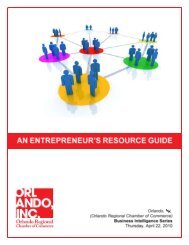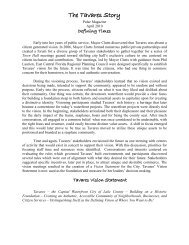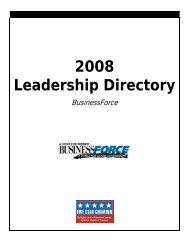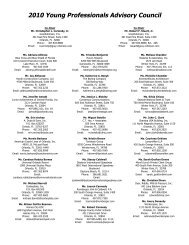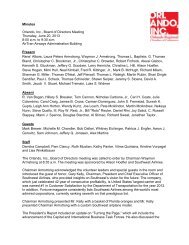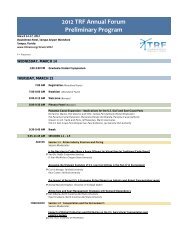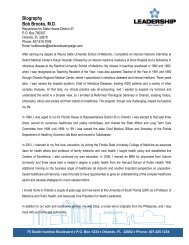FM Sept 04_PDF.qxd - Orlando Chamber of Commerce
FM Sept 04_PDF.qxd - Orlando Chamber of Commerce
FM Sept 04_PDF.qxd - Orlando Chamber of Commerce
Create successful ePaper yourself
Turn your PDF publications into a flip-book with our unique Google optimized e-Paper software.
BUSINESS & TECHNOLOGY<br />
Stressing Time<br />
How to make the best use <strong>of</strong> available hours.<br />
By Paul DePalma, President and Founder, BusinessWorks Inc.<br />
“God put me on this earth to<br />
accomplish a certain number <strong>of</strong><br />
things…Right now, I’m so far<br />
behind I’ll never die.”<br />
— Anonymous<br />
A recent BusinessWorks<br />
study <strong>of</strong> mid-level managers<br />
showed that they consider stress<br />
reduction the number-one priority<br />
to address in order to improve<br />
their working life.<br />
The key reason for the stress is<br />
feeling they have too much to do<br />
and too little time to do it. Many<br />
say they want to manage time<br />
more effectively.<br />
The idea <strong>of</strong> personal time management<br />
or controlling priorities<br />
has been around in various forms<br />
for years, even though the phrase<br />
“time management” itself is<br />
inaccurate. Time is ongoing, it<br />
cannot be changed, and the same<br />
amount is available to everyone.<br />
Nevertheless, we pay a great deal<br />
<strong>of</strong> attention to time management<br />
in everyday life and especially in<br />
business. But our experience<br />
dealing with hundreds <strong>of</strong> executives<br />
indicates that few are actually<br />
practicing the basics <strong>of</strong> sound<br />
time management.<br />
The gap between knowing what<br />
to do and knowing we’re not doing<br />
it is a cause <strong>of</strong> stress. We all like to<br />
feel we’re making progress, we’re<br />
green and growing, and we’re<br />
moving in a positive direction.<br />
Trying something over and over<br />
and being unable to do it is<br />
frustrating. With the demands<br />
<strong>of</strong> the workplace and our hectic<br />
personal lives increasing daily,<br />
we all need to be able to organize<br />
our individual and business<br />
responsibilities more effectively.<br />
People <strong>of</strong>ten ask us if time tools<br />
like planners and PDAs work and<br />
which one is the best? This is like<br />
asking about exercise equipment.<br />
On television, we are inundated<br />
with infomercials about products<br />
for burning our thighs, building our<br />
chests, and toning our abs. But the<br />
piece <strong>of</strong> equipment that will serve<br />
us best is the one we use consistently.<br />
It’s not going to work if we only<br />
With the demands <strong>of</strong><br />
the workplace and<br />
our hectic personal<br />
lives increasing daily,<br />
we all need to be<br />
able to organize<br />
our individual and<br />
business responsibilities<br />
more effectively.<br />
use it for hanging our clothes or<br />
to sit on while we put on our<br />
socks. Time tools can help if we<br />
have established the patterns and<br />
techniques to use them effectively,<br />
and we actually use them. But no<br />
tool can do the thinking, planning,<br />
and decision-making required to<br />
improve personal effectiveness.<br />
So what can you do to reduce<br />
stress and make the best use <strong>of</strong><br />
available hours?<br />
1. Clarify your priorities.<br />
Selecting priorities is the best way<br />
to make the most <strong>of</strong> your time.<br />
Having conflicting priorities is<br />
the way to waste time and create<br />
stress. Reviewing, analyzing, and<br />
determining your critical priorities<br />
at work and in private life are your<br />
major investments in beginning to<br />
manage available time.<br />
2. Focus on what you really<br />
want to accomplish. With the<br />
priorities as the major themes, focus<br />
on making your goals and objectives<br />
as specific as possible. Make sure to<br />
break down large tasks into smaller,<br />
realistic steps.<br />
3. Strive for excellence. So many <strong>of</strong><br />
us strive for perfection and become<br />
discouraged when we fall short.<br />
This creates a kind <strong>of</strong> yo-yo <strong>of</strong> our<br />
mood and motivation where we are<br />
up and down trying to achieve our<br />
objectives in the shortest time. The<br />
yo-yo effect is tiring and frustrating.<br />
By striving for excellence we focus<br />
on consistency and long-term<br />
benefits and allow room for being<br />
human and the little obstacles that<br />
invariably get in the way.<br />
4. Know how you’re doing. If you<br />
can work on the first three points,<br />
you’re close to achieving this one.<br />
Be open and honest with yourself<br />
about your progress. Use some form<br />
<strong>of</strong> objective measurement; a simple<br />
graph, chart, or scale helps us stay<br />
focused on our progress and can<br />
minimize negative emotions based<br />
on false perceptions that can move<br />
us <strong>of</strong>f track.<br />
Managing time and priorities<br />
come with action. It’s not what we<br />
know about time management, but<br />
what we do with what we know<br />
that produces results.<br />
For more, contact Paul DePalma<br />
at 407-660-5757 or via e-mail at<br />
paul@businessworks-inc.com. Access<br />
the BusinessWorks Inc. Web site at<br />
www.businessworks-inc.com.<br />
Since 1992, BusinessWorks has helped<br />
both for-pr<strong>of</strong>it and not-for-pr<strong>of</strong>it organizations<br />
optimize human dynamics for<br />
improved business performance. The<br />
company uses proven organization<br />
development methodologies to help<br />
companies analyze and improve how<br />
to produce results through the planned<br />
development and reinforcement <strong>of</strong><br />
the organizations’ strategies and<br />
structures; systems and processes;<br />
and dynamics and culture.<br />
8 SEPTEMBER 20<strong>04</strong> <strong>FM</strong>



